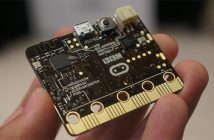
President Obama has signed a new education bill that will take the place of the controversial ‘No Child Left Behind Act’ from 2001 — and the Every Student Succeeds Act (ESSA) will also provide a boost to computer science education.
While the thirteen-year-old act connected funding of schools to the scores that students achieved on standardized tests, ESSA reduces some of the control that the federal government has on education. But according to EnGadget’s Sean Buckley, the new act also makes computer science just as important as other “well-rounded” school subjects.
Frank Smith of EdTech feels that the new legislation could close the gap in student achievement. Smith explains:
“The latest update to the U.S. National Education Technology Plan has big plans for addressing unequal access to the powerful technology changing schools today. On Thursday, [December 10th] the U.S. Department of Education laid out a vision for the future of technology at schools. The new plan updates technology guidelines issued in 2010, but doesn’t change direction dramatically. Instead, the latest plan sets up a series of bold calls to action designed to ensure technology helps close the achievement gap.”
The Every Student Succeeds Act (ESSA) includes various block grants that, along with other uses, are created for technology-related courses. Dennis Pierce of eSchool News shares how the bill will boost funding for ed-tech:
“Although it’s not the program that ed-tech advocates had hoped for, many expressed cautious optimism that a section of ESSA under Title IV (“21st Century Schools”) could help schools use technology tools to transform teaching and learning.”
The bill comes a full eight years after the No Child Left Behind Act was supposed to expire. The ESSA gives the state more power in choosing how to close gaps in student achievement and gives more importance to technology-related courses.
It is the first time that technology has received funding since 2010. That year, the Enhancing Education Through Technology program was funded. There is also E-Rate, which provides discounts for some technology-related services such as internet access and telecommunications needed to bring the web to the classroom.
According to Yoree Koh blogger for the Wall Street Journal, the new law will likely bring good news for tech companies who continually deal with a shortage of engineers to employ. These companies, including leaders like Google and Microsoft, have been backing any bill that would increase the teaching of computer science in the classroom.
Hadi Partovia, the founder of Code.org, is also pleased that the bill is going through. Partovia stated in an email:
“This week marks a watershed moment for computer science in U.S. Schools. In just two years this field has been adopted by all the largest cities, almost 100 school districts. It’s great to see the Federal government finally recognize this field as a foundational academic subject.”
The overall hope is that this bill will cause computer science to find its way into more American classrooms, leading to more graduates who qualify to work at tech companies. Code.org shares that while there are over 600,000 computer jobs currently open in the US, only 38,175 students graduated from computer science courses last year.




